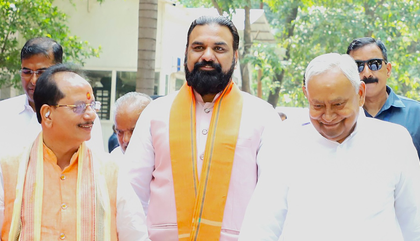As poll process heats up in states, it's time to party-hop for some
By IANS | Updated: October 9, 2025 19:30 IST2025-10-09T19:28:05+5:302025-10-09T19:30:11+5:30
New Delhi, Oct 9 Even as Bihar gears up for upcoming Assembly elections scheduled for November 6 and ...

As poll process heats up in states, it's time to party-hop for some
New Delhi, Oct 9 Even as Bihar gears up for upcoming Assembly elections scheduled for November 6 and 11, reports are coming on political leaders switching allegiance, possibly looking for a comparatively comfortable victory or elevation in the party hierarchy.
Rashtriya Janata Dal (RJD) MLA Bharat Bind, who was reported to have joined the Bharatiya Janata Party (BJP) earlier this year, recently resigned from the state Assembly.
In 2020, Bind won from Bihar's Bhabua Assembly constituency defeating his nearest rival Rinki Rani Pandey of the Bharatiya Janata Party (BJP) by more than 10,000 votes.
In the 2015 Assembly polls, contesting from the same seat, but on a Bahujan Samaj Party (BSP) ticket, Bind came a distant third behind the BJP and Janata Dal-United (JD-U) candidates.
Incidentally, in 2015, JD-U was not in alliance with the BJP.
Similarly, Congress MLA Murari Prasad Gautam, who defeated JD-U's Lalan Paswan by 18,000 votes at the Chenari Assembly seat in 2020 state polls, has also resigned.
Incidentally, Paswan won the seat in 2015, but then as an Rashtriya Lok Samata Party (RLSP) candidate.
Former Union Minister Nagmani Kushwaha has changed, or launched, close to a dozen parties in the last 23 years.
The septuagenarian Dalit leader is followed by the sexagenarian Upendra Kushwaha, another former Union Minister who has also turned from one to another organisation about half-a-dozen times.
Samrat Choudhary, currently the Deputy Chief Minister in Bihar, has also been leader of the state's principal political parties before joining the BJP.
Though JD-U supremo and Chief Minister Nitish Kumar has earned the sobriquet of "paltu ram" or the flip-flop man, it has been for changing alliance partners.
It was the same for the late Ram Vilas Paswan, who was known as the political weathercock, who would sense the mandate even before election results are announced and ally with the winning side.
Former Bihar Chief Minister Jitan Ram Manjhi has also been shifting alliance in the past 10 years.
Party hopping is not a recent phenomenon.
In 1967-68, for close to a year, there were several such flip-flops by legislators in several states.
Thus, in 1969, the Y.B. Chavan Committee was asked to address the issue of defections.
Between the first and the fourth general elections (1951-1967), some 540 instances of defections have been reported.
The trend was, and still is, found also among Independent candidates, especially in case of a hung verdict.
It has been observed that, termed as "horse trading", the lure of material gain and office play a dominant part in such decisions of defection.
The Constitution (Thirty-second Amendment) Bill, 1973, was introduced in the Lok Sabha on May 16, 1973, for constitutionally providing for disqualification on defections.
It was referred to a Joint Committee of the Houses of Parliament which became defunct with the dissolution of the fifth Lok Sabha in 1977.
The Constitution (Forty-eighth Amendment) Bill, 1979, introduced in the Lok Sabha in another attempt to check defection was withdrawn, being opposed by members from both the ruling and opposition parties.
After the 1984 general elections, one more move was made through the Constitution (Fifty-second Amendment) Bill in Lok Sabha and an anti-defection law was brought in January 1985 to check such party-hopping.
However, the choice of joining a political party can not be entirely banned, considering a person's right to do so in a democratic setup.
"Aya Ram, Gaya Ram (he comes, he goes)" is often used to reflect the journey of party-hoppers.
In Haryana, Bhajan Lal was once termed the "master of horse-trading" with his inherent power of persuasion and forging alliances across party lines.
Some legislators from the state, like Hira Nand Arya and Gaya Lal, are still recalled for their political somersaults.
Such political travellers are, however, not limited to politics in India alone.
There are several such instances from others nations, like Britain and Australia.
Disclaimer: This post has been auto-published from an agency feed without any modifications to the text and has not been reviewed by an editor
Open in app